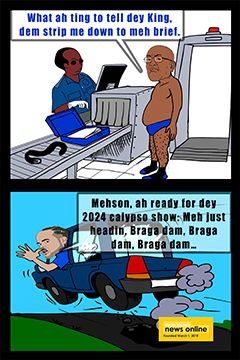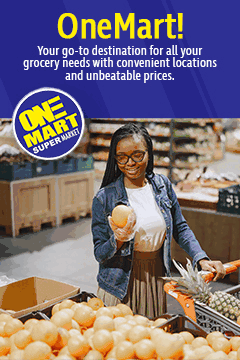The Bahamas to ban single-use plastics by 2020
NASSAU, Bahamas - Minister of the Environment and Housing Romauld Ferreira has announced that in an effort to simultaneously address marine pollution and waste management, single-use plastics – such as shopping bags, food utensils, straws and Styrofoam food containers – will be banned by 2020.
He said his ministry will work to develop a phase-out plan.
“We will also move to make the release of balloons into the air illegal, as they end up in our oceans, releasing toxins and injuring marine life,” Ferreira added. “Additionally, we will become a signatory to the Clean Seas Campaign, which was launched in January 2017 by the United Nations Environment. It aims to increase global awareness of the need to reduce marine litter by engaging governments, the private sector, and the general public.”
He noted that, with the assistance of a diverse group of environmental professionals, the Bahamas Chamber of Commerce and Employers’ Confederation (BCCEC) and the business community at large, relevant governmental agencies and educational institutions, his Ministry will embark on a nation-wide public consultation and educational outreach campaign.
“We will visit communities and schools, hold town hall meetings and meet with businesses to gather valuable data that will assist us in developing a fair and reasonable phase-out plan by 2020 and associated legislation,” Minister Ferreira said.
“In the coming weeks, we will be reaching out to businesses that have already incorporated sustainable food products within their daily operations,” he added, noting that, with the assistance of the BCCEC, his Ministry would also start meeting with restaurants, suppliers, importers and various food vendors.
Minister Ferreira said that The Bahamas is a “delicate” country with an extensive marine environment that is fundamental to its health and economy. And he noted that, like many other countries, it has an “exacerbating” plastic problem that has significant economic and environmental costs.
“If you didn’t know, plastic and Styrofoam do not decompose,” he added. “They break down into much smaller micro-pieces which are often mistaken for food by birds, turtles, and fish. Injuring or even causing death, various marine species have been impacted by marine debris through entanglement, ingestion, chemical bio-accumulation, smothering and the altering of habitats.”
Minister Ferreira said that plastic contamination is passed on through the food chain, accumulating from prey to predator and ultimately culminating in humans.
“Now, we have come full cycle and find ourselves eating our own plastic waste,” he pointed out.
He noted that Styrofoam usage is similarly disastrous. Manufactured with greenhouse gases that affect the ozone layer and petroleum, it is non-sustainable and a highly polluting product, Minister Ferreira added.
“When used in microwaves, Styrofoam releases fluorocarbons into the air and several other poisonous gases are absorbed into whatever food item it contains,” Ferreira said, adding that chemical leaching from Styrofoam had been linked to acute health effects such as the irritation of the skin, eyes and upper respiratory tract and gastrointestinal system.
“Research has also connected the long-term exposure to Styrofoam to minor effects on kidney function and menstrual cycles of women.”
Ferreira also addressed the impact of plastic pollution on the Bahamian tourism sector.
“A survey done by the Ministry of Tourism found that 70 percent of visitors come to The Bahamas for its beaches,” Minister Ferreira noted. “However, the Bahamas Plastic Movement estimates that if the rate of plastic pollution on beaches increases, it could cause up to $8.5 million in tourism losses annually for the country. Thus, the country urgently needs laws and swift action to protect its people, environment, and economy.”
The minister appealed to the general public for its support in implementing the plastics ban.
“We value your input and look forward to engaging you throughout this process,” he said.
“In an effort to lead by example, my ministry has officially banned the purchase and supply of Styrofoam cups in our offices. Instead, we encourage all employees to bring their own mug and reusable water bottles to work. We are working to expand our office sustainability plan so that it may be echoed throughout the public sector.”










.png)




.png)



.png)






















Leave a Reply